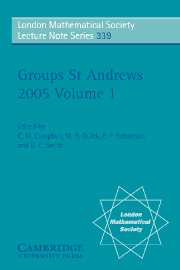Book contents
- Frontmatter
- Contents
- Introduction
- Aspects of infinite permutation groups
- Self-similarity and branching in group theory
- On surface groups: motivating examples in combinatorial group theory
- Nilpotent p-algebras and factorized p-groups
- Classification of finite groups by the number of element centralizers
- Algorithmic use of the Mal'cev correspondence
- Minimal but inefficient presentations for semi-direct products of finite cyclic monoids
- The modular isomorphism problem for finite p-groups with a cyclic subgroup of index p2
- On one-generated formations
- New results on products of finite groups
- Radical locally finite T-groups
- Explicit tilting complexes for the Broué conjecture on 3-blocks
- Conjugacy classes of p-regular elements in p-solvable groups
- An algorithm for the unit group of the Burnside ring of a finite group
- Integral group ring of the first Mathieu simple group
- Embedding properties in direct products
- Malcev presentations for subsemigroups of groups — a survey
- Finite groups with extremal conditions on sizes of conjugacy classes and on degrees of irreducible characters
- Conjugacy class structure in simple algebraic groups
- On automorphisms of products of groups
- Linear groups with infinite central dimension
- G-automata, counter languages and the Chomsky hierarchy
- An embedding theorem for groups universally equivalent to free nilpotent groups
- Irreducible word problems in groups
- Recent growth results
Radical locally finite T-groups
Published online by Cambridge University Press: 07 May 2010
- Frontmatter
- Contents
- Introduction
- Aspects of infinite permutation groups
- Self-similarity and branching in group theory
- On surface groups: motivating examples in combinatorial group theory
- Nilpotent p-algebras and factorized p-groups
- Classification of finite groups by the number of element centralizers
- Algorithmic use of the Mal'cev correspondence
- Minimal but inefficient presentations for semi-direct products of finite cyclic monoids
- The modular isomorphism problem for finite p-groups with a cyclic subgroup of index p2
- On one-generated formations
- New results on products of finite groups
- Radical locally finite T-groups
- Explicit tilting complexes for the Broué conjecture on 3-blocks
- Conjugacy classes of p-regular elements in p-solvable groups
- An algorithm for the unit group of the Burnside ring of a finite group
- Integral group ring of the first Mathieu simple group
- Embedding properties in direct products
- Malcev presentations for subsemigroups of groups — a survey
- Finite groups with extremal conditions on sizes of conjugacy classes and on degrees of irreducible characters
- Conjugacy class structure in simple algebraic groups
- On automorphisms of products of groups
- Linear groups with infinite central dimension
- G-automata, counter languages and the Chomsky hierarchy
- An embedding theorem for groups universally equivalent to free nilpotent groups
- Irreducible word problems in groups
- Recent growth results
Summary
Introduction
A group G is said to be a T-group if every subnormal subgroup of G is normal in G, that is, if normality is a transitive relation in G. The study of this class of groups begins with the publication of a paper of Dedekind in 1896. He characterizes the finite groups in which every subgroup is normal. These groups, called Dedekind groups, are obvious examples of T-groups. The extension of Dedekind's result to infinite groups was proved by Baer in 1933.
Theorem (Dedekind, Baer)All the subgroups of a group G are normal if and only if G is abelian or the direct product of a quaternion group of order 8, an elementary abelian 2-group and an abelian group with all its elements of odd order.
In 1942, E. Best and O. Taussky [5] prove that every finite group with cyclic Sylow subgroups is a T-group. Later G. Zacher characterized soluble finite Tgroups by means of Sylow towers properties (see [12]). However, the decisive result about the structure of T-groups in the finite soluble universe was obtained by Gaschütz in 1957 ([8]).
Theorem (Gaschütz)Let G be a finite soluble group. Then G is a T-group if and only if it has an abelian normal Hall subgroup L of odd order such that G/L is a Dedekind group and the elements of G induce power automorphisms in L.
- Type
- Chapter
- Information
- Groups St Andrews 2005 , pp. 203 - 206Publisher: Cambridge University PressPrint publication year: 2007

